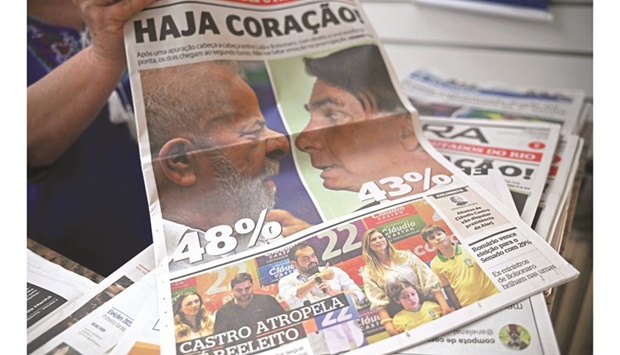• Right-wing wins in Brazil’s Congress show staying power of ‘Bolsonarismo’
Brazil entered the final stretch of a deeply polarised presidential race yesterday after an inconclusive first voting round put far-right incumbent Jair Bolsonaro in an unexpectedly strong position.
Bolsonaro, 67, garnered 43% of Sunday’s first-round votes compared to 48% for leftist frontrunner Luiz Inacio Lula da Silva – a five-point difference that polls had predicted would be a much larger gap of 14 points.
Former president Lula, 76, had appeared to be within arm’s reach of taking the election in the first round with more than 50% of the vote – but the presidential race now heads to a October 30 run-off.
Not only Bolsonaro surpassed expectations: many allies of his “God, country and family” brand of conservative politics also performed better than poll predictions in congressional and gubernatorial races.
It signalled enthusiasm for the far-right leader and his policies despite Bolsonaro’s controversial four-year tenure, marked by a shocking pandemic death toll blamed in part on his coronavirus (Covid-19)-sceptic approach, surging destruction of the Amazon rainforest, and a sharp rise in Brazilians living in hunger.
The Sao Paulo Stock Exchange welcomed the first-round results in Latin America’s largest economy with a rise of more than 4% yesterday morning.
Both men declared themselves ready for the final campaign to attract the vote of some 9mn Brazilians who cast their ballot for minority candidates – none of whom managed to break through 5mn of support – and 31mn others who did not vote at all.
Lula, who wasted no time convening his campaign team for a strategy meeting yesterday, said: “We will have to convince Brazilian society of what we are proposing.”
Addressing dumbstruck supporters in Sao Paulo on Sunday, the leftist icon said he would start campaigning without delay, with more meetings with voters.
Lula said he looked forward to debating Bolsonaro head-to-head “to see if he’s going to keep telling lies” and promised supporters: “The fight continues until the final victory!”
For his part, Bolsonaro tweeted: “We had more votes in the first round than in 2018 (when he won the presidency) – nearly 2mn.”
He added: “By the grace of God I have never lost an election and I know that we will not lose this time.”
Analysts say Bolsonaro’s performance bodes for a stressful and divisive four weeks before the vote.
The incumbent has repeatedly sought to cast doubt on Brazil’s electronic voting system and questioned the validity of opinion polls placing him a distant second.
Now, he can argue that Sunday’s results bear out his claims.
Bolsonaro’s rhetoric has raised fears that he could trigger a Brazilian version of the riots last year at the US Capitol after former president Donald Trump refused to accept his election defeat.
Bolsonaro “will be very emboldened” by Sunday’s electoral performance, said Michael Shifter of the Inter-American Dialogue think tank.
“He’s beaten the expectations ... he will play on that the experts were wrong: ‘I’ve got the momentum and I’ll defy expectations again in the second round’.”
Passions will be high on both sides.
Bolsonaro now has “an extra month to cause turmoil in the streets”, political scientist Guilherme Casaroes of the Getulio Vargas Foundation’s (FGV) Sao Paulo School of Business Administration told AFP. “Any kind of doubt that he casts upon the electoral system will work in his favour ... demobilising voters not to go vote for Lula” – who left office after two terms in 2010 with an unprecedented 87% approval rating and is credited with helping lift 30mn people out of poverty.
Bolsonaro will continue hammering on Lula’s flaws, including his conviction for corruption – since overturned in court, but not in the court of public opinion, analysts say.
“Lula’s chances of being elected seem considerably slighter,” said Casaroes.
As for Bolsonaro, it now appeared he “could make this a contest”, said Shifter. “Instead of the great comeback (for Lula) it could be the great upset.”
Voter Mateus Alcantara, a 26-year-old publicist, said in Rio de Janeiro his country was living a moment of “enormous polarisation”.
“Bolsonarism is growing more and more, and this is a reflection of a very conservative country,” he told AFP.
Bolsonaro’s party meanwhile won the most seats in both chambers of Congress, highlighting the enduring strength of his conservative movement.
His right-wing Liberal Party (PL), won 99 seats in the 513-member lower house, up from 77, and right-leaning parties allied with Bolsonaro now control half the chamber.
The bigger surprise in Sunday’s voting was in the Senate where Bolsonaro’s party won 13 of the 27 seats up for grabs, with two more possible in second-round run-offs, a party spokesman said.
Bolsonaro helped elect allies to the Senate who had trailed in opinion polls, such as former ministers Damares Alves and Paulo Pontes.
Alves, an evangelical ally, defeated the Senate candidate from Bolsonaro’s own party.
The strong right-wing showing in legislative and gubernatorial races, especially in more affluent southeast Brazil, made Bolsonaro the election’s big winner.
Lula’s Workers Party won 10 more seats in the lower house of Congress, where it remains the second-largest party with 68 representatives.
Bolsonaro’s allies also made advances in state politics, including races for governor.
His former Infrastructure Minister Tarcisio Freitas, who took part in motorcycle rallies with Bolsonaro, won the most votes for governor of Sao Paulo, Brazil’s largest state, and will face Lula ally Fernando Haddad in an October 30 run-off.
Bolsonaro boasted of helping to get eight governors elected outright, with hopes of electing eight more in the second round.

